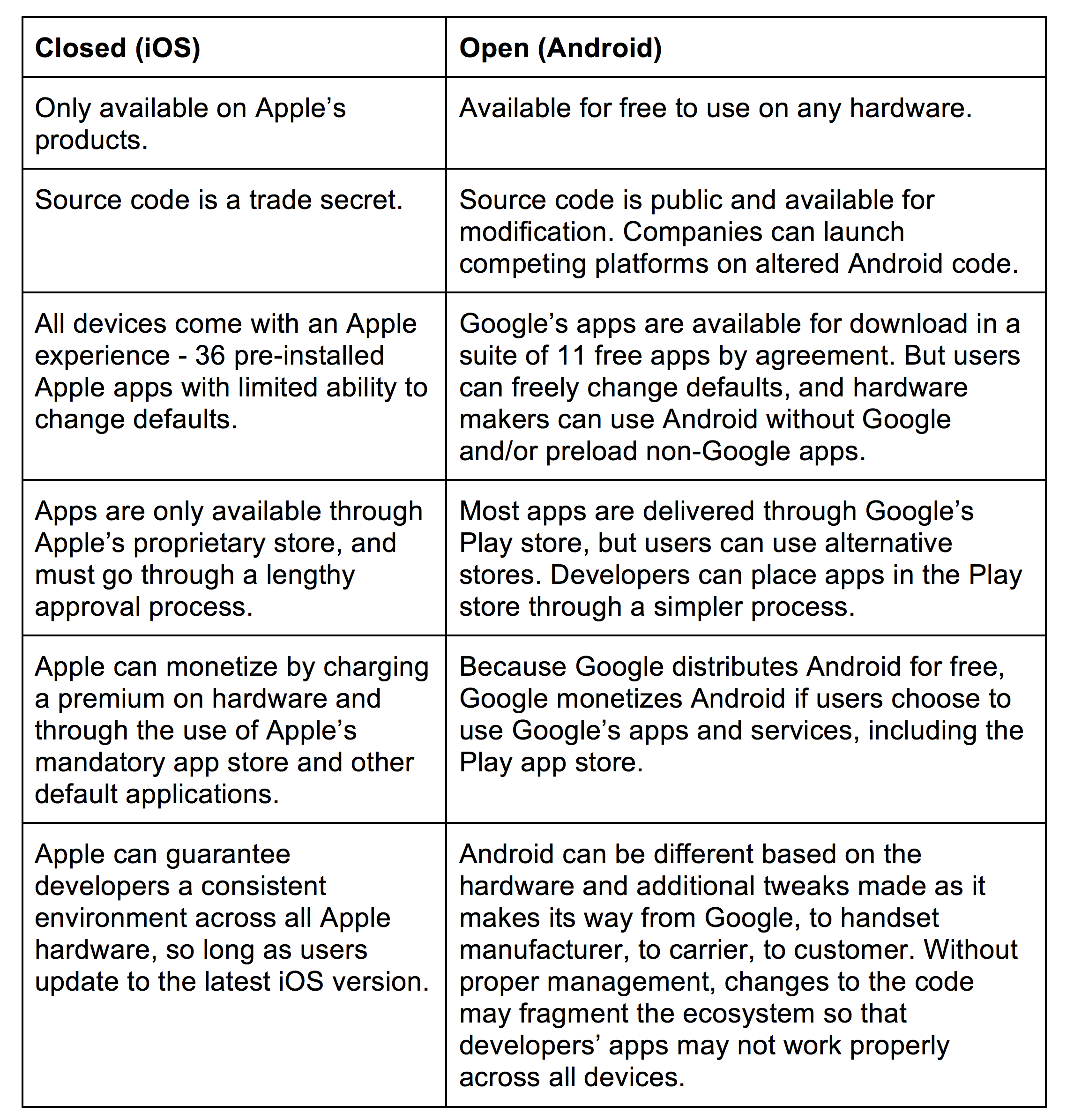The EC’s Expected Decision Against Android Is an Unfortunate Attack on Open Source Software
The European Commission (“EC”) is preparing to release its decision against Android, and its framing of the issues makes clear that successful open source software will have a hard time in Europe. In its Statement of Objections, the Commission signaled that Apple’s iOS, Android’s fiercest rival, would be excluded from the market definition because it is closed source and not available to other hardware makers. The decision is expected to declare unlawful strategies to monetize a free product, provide a consistent user experience to customers expecting the Google brand, and to maintain code consistency to minimize problems for developers using the platform. The decision is not expected to contain any indication on how open source platform developers can solve these problems that are fundamental to their success.
The message is clear, even if it is unintended: if you want to be successful in Europe your software must be closed (and more expensive). The EC’s expected decision largely falls apart if we imagine that Android is closed rather than open. And regardless of whether Android stays open or becomes closed, Android could become more expensive in order to bring Android into compliance if the decision follows what has been foreshadowed by the EC. This is an unfortunate result, because while Apple’s competing iOS is innovative – it is a premium product that is out of reach for many consumers. The current Android OS is open and free for hardware makers, a feature that has led to many affordable products being developed for sale. Pressuring companies to end open development could have the unintended effect of destroying the market for affordable phones and tablets.
Closed v. Open
The decision to make software available through a closed or open ecosystem is an important business decision with many implications. Closed platforms offer their creators the most control in where and how developers use the platform in order to create a consistent and integrated experience for users. In contrast, open is far more welcoming to third parties, assuming the platform is properly maintained to avoid fragmentation, and thus allows developers a quicker and freer path to distribution. Here is a comparison between the closed source iOS and the open source Android:

The EC’s Case
The EC’s statement of objections had three major charges:
- preventing manufacturers using Google’s version of Android from also selling devices running on incompatible “forked” versions of operating systems based on the Android open source code;
- requiring manufacturers to pre-install Google Search and Google’s Chrome browser and requiring them to set Google Search as default search service on their devices, as a condition to license certain Google proprietary apps; and
- giving financial incentives to manufacturers and mobile network operators on condition that they exclusively pre-install Google Search on their devices.
The EC signaled that its chief concerns were that these activities further entrench Google search, make it more difficult for mobile operating browsers to compete with Google Chrome, and hinder the development of new operating systems based on the Android code base. In its Statement of Objections, the EC stated that its preliminary assessment is that “this conduct ultimately harms consumers because they are not given as wide a choice as possible and because it stifles innovation.” (This statement seems unusual when directly comparing Android to Apple’s iOS.)
The EC Is Punishing Android for Being Open
It is clear that if Android were closed source it would have fared far better in the EC’s investigation. For one, Google would not have needed agreements to enforce device consistency to avoid fragmentation, one of the agreements targeted by the EC, because Google would have complete control over its code. This would mean that a program designed to work on Android is sure to work on every Android device, rendering the danger of fragmentation inapplicable. But it would also mean that no other company would have access to Android’s code or be able to use the code to create a competing platform. This would mean that other mobile platforms based on Android code would not be able to emerge.
Indeed, rather than creating a free operating system for device makers, Google could have followed Apple’s model of reserving its operating system for its own hardware and not selling to other manufacturers — leaving us in a world with just two major device makers. This would have eliminated the device maker agreements on which the EC bases its case and theoretically given Google the same control that Apple has to create a user experience through pre-installed apps. Furthermore, there would be less of a reason to exclude Apple’s rival operating system iOS from the market definition. This would surely have a big impact on the case, because the EC would be in no position to ignore the competitive pressure exercised by Apple. When only looking at the EU, iOS commands about 25% of mobile operating system installs to Android’s 72%. Additionally, the European Parliamentary Research Service reports that iOS is roughly a third of the market by number of devices and app downloads, and that Apple’s worldwide app store revenue is actually over 3.5 times greater than Google’s — $28 billion to $7.8 billion. It’s clear that Apple and Android battle for users and developers — a point that the EC ignored in its case — but its gerrymandered market definition would evaporate if Google had chosen Apple’s path.
The EC’s Unintended Discouragement of Open Source Software
The EC’s expected decision will make the simplest solutions to problems facing open source development unlawful. These problems can be summarized as experience, consistency, and monetization. Each of the EC’s three findings can be just as easily explained as a procompetitive solution to one of these problems.
Experience. Users associate Android with Google and generally expect a Google-branded experience when purchasing an Android phone, hence the need for a preloaded suite of apps that allow consumers to use Android phones “out of the box.” If their “Google phone” doesn’t work like those of their friends, or how they expect, then it is Google that will likely receive the blame. Google has lent its brand to Android and therefore its brand can suffer if Android users don’t get the experience they want and expect. What the EC describes as unlawful tying can also be described as presenting a cohesive Google experience to consumers who expect Google on their phones. The iPhone also ships with a great amount of pre-installed apps. Companies can still use Android without Google’s core suite (and therefore not have Google’s branding) or preload other apps, either action presenting a much lower risk for brand confusion that would harm Google.
Consistency. Open source’s strength is also its weakness — anyone can fiddle with it. Major drifts in the code of an operating system could mean that an application that works on one device will not work on another. This greatly decreases the attraction of developing for a platform. A developer who makes a product for a fragmented ecosystem could easily end up with many unhappy customers who can’t successfully use their software because their operating system differs from the version the developer coded for. Law professor Christopher Yoo examined this fragmentation problem using real examples from the open source software community. Yoo concluded that successful open source software must address the fragmentation problem and that Google’s Anti-Fragmentation Agreement was a reasonable resolution of this problem. The EC’s decision to punish this strategy alone could disincentivize the development of any future long-run open source platform in Europe.
Monetization. The difference between the profits of Apple’s iOS products and Google’s Android products should prove the difficulty in monetizing an open source platform as compared to a closed source one. However, this should be a feature and not a bug. It is consumers who largely benefit from this in the form of less expensive smartphones and tablets, and more variety in their choice of products. A company cannot be expected to provide something like Android purely as a public service. Of course Google would want hardware makers to install applications that Google could use to earn a return on its investments and innovations in the Android operating system. However, a key difference between the closed iOS and the open Android OS is the amount of competition facing Google for preloaded space. Hardware manufacturers are free to preload non-Google apps. That option is not available for iOS developers. In addition, users have limited options too, as iOS prohibits their ability to use, for example, a different app store or default browser. Android even presents users with a sort of default ballot box when they install new apps to make it easier for them to switch. Thus, Google is using a tailored approach for its platform, finding a way to monetize while allowing considerable opportunity for rivals.
In effect, the EC is attacking the business model that supports a free and open platform, and preferring a model where manufacturers would either have to pay Google for Android or spend considerable resources building their own operating systems.
The EC’s anticipated decision thus is likely to backfire with increased prices on devices and reduced choices for consumers. By punishing the most successful open platform to have ever been developed, the EC would send a strong signal that open software is not worth the headache. Ironically, Android currently offers far more choice, opportunities to compete, and low priced options for consumers than the competing closed iOS ecosystem. If the message is become more like iOS, then the EC will have failed in promoting competition.








